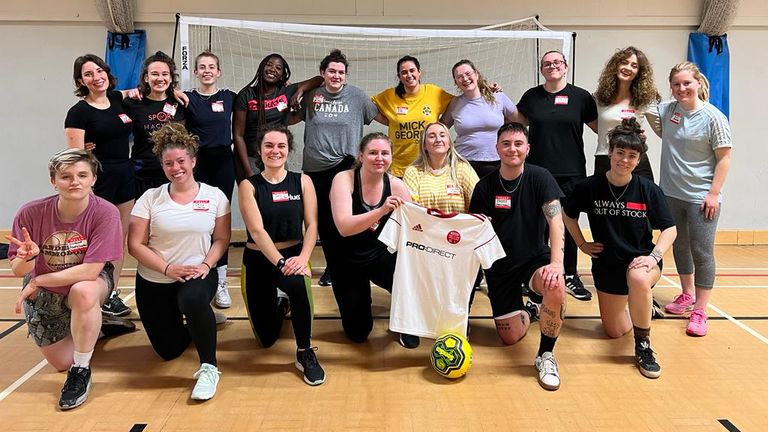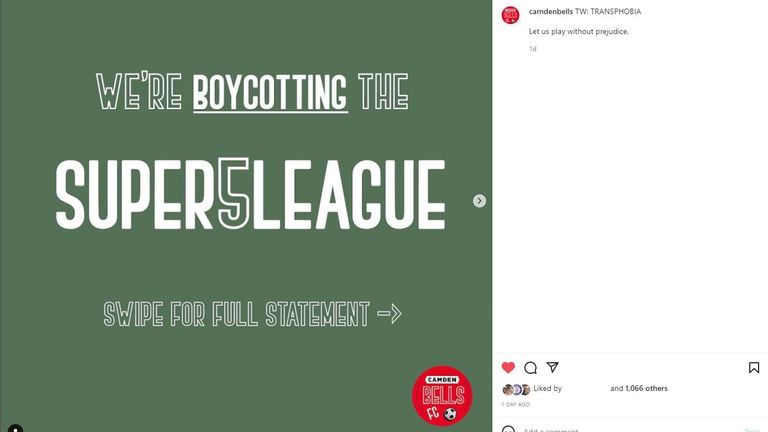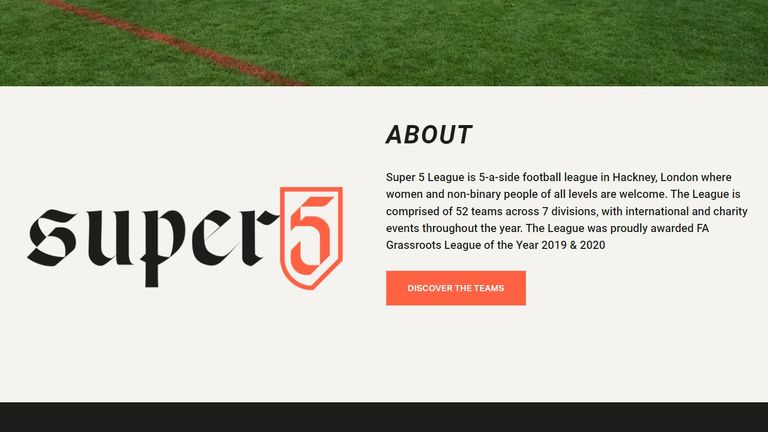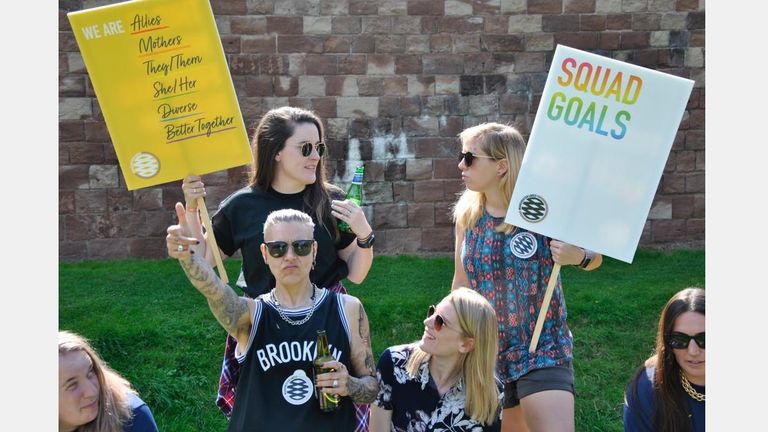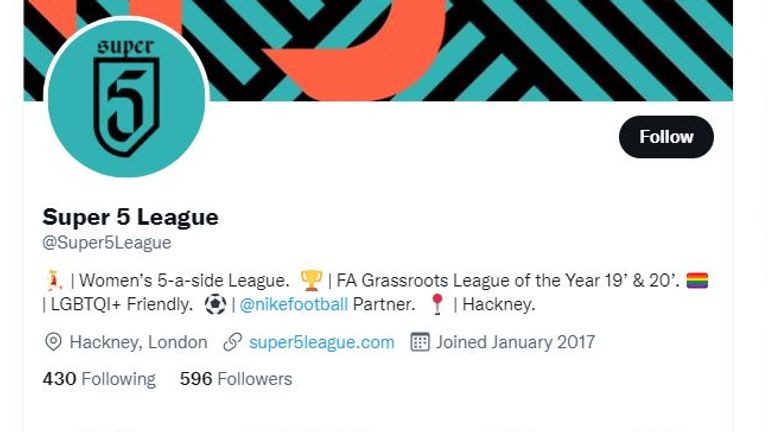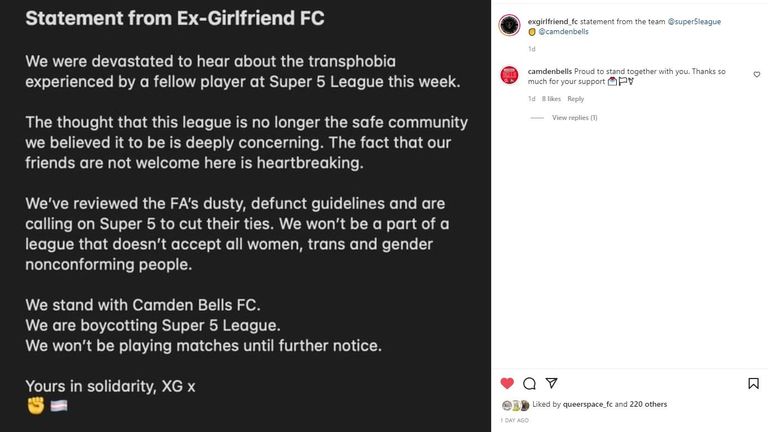Clubs supporting trans inclusion in amateur football are boycotting award-winning league for women and non-binary people
Camden Bells FC lead boycott of 'LGBTQI+ friendly' 5-a-side league in support of trans and non-binary team-mates; Manchester Laces FC, who want FA to update its trans policy, call for "integrity and honesty" at amateur level; Super 5 League suspends fixtures; Amateur FA issues statement
Tuesday 8 February 2022 17:42, UK
A number of amateur clubs have said they are boycotting an award-winning grassroots football league as a show of support to their transgender and non-binary players.
The Super 5 League (Super5) in Hackney, East London, has expanded rapidly since starting up in 2017 and now has over 50 teams playing in seven divisions.
The 5-a-side league promotes itself as a sports environment "where women and non-binary people of all levels are welcome". It was named Project of the Year at the 2020 FA and McDonald's Grassroots Football Awards, and has a partnership with Nike Football along with other sponsors.
However, the league's commitment to inclusion has been called into question after Camden Bells FC - formed in late 2021 - were challenged over the eligibility of a player after their very first fixture last week.
According to a statement issued by the Bells via Instagram, a Super5 official told the team that due to concerns for the welfare of their future opponents, the player - who is trans non-binary - should not be allowed to play in a "women's league".
The Bells' statement said: "We were appalled by this conversation as this league claims to be an inclusive space - with 'LGBTQIA+ & non-binary friendly' plastered across their marketing materials."
The league official advised the Bells' founder, Hannah Thornley, that she should consult with the Football Association to resolve the matter.
Thornley made contact with the Amateur FA but says her discussions with them were "unhelpful" and after speaking to the player in question, and then with the rest of the club's squad at training, a decision was taken to boycott the Super5, with the Bells having felt misled over its LGBTQ+-inclusive messaging.
Since the Bells published their statement on social media, four more Super5 clubs have publicly announced they will follow suit in boycotting the league.
A further five clubs have told Thornley that they are considering their membership. In total, 22 Super5 clubs will attend a meeting on Monday evening to talk about next steps.
Thornley says the Bells specifically joined Super5 because they have trans and non-binary players within their squad. The team was starting out in a friendly 'beginners' league' with other newly-recruited clubs and as amateurs, they were not anticipating being told to comply with the FA's trans inclusion policy - last updated seven years ago - in order to play 5-a-side.
"The league claims to be this inclusive space and it's clearly not when they're following the rules of the FA that were put in place in 2015," Thornley told Sky Sports.
"I spoke to the [Amateur] FA and they were not very helpful at all. Their answers to the points that I was making sounded like they were coming from a script. They were very blanket responses.
"Every point that I made, they came back and said that we were welcome to join a mixed league, or that my player was welcome to leave and join a team and play with men.
"But I set up this club so that everybody could be included, feel held, seen, loved, and free to play. This is grassroots sport - we should really not have to fight."
The FA's existing trans inclusion policy - applicable only to participation in domestic football and competitions that are governed by the organisation - operates on a case-by-case basis and requires applicants who are trans to meet hormone-based requirements and provide additional evidence of their transition.
"If these requirements are met," reads the document, "The FA will only refuse an application if The FA decides in its absolute discretion that it is necessary... to ensure (1) the applicant's and fellow players' safety and/or (2) fair competition."
There is no mention in the 2015 policy of 'non-binary' identities, with references only to 'male' or 'female' players. In 2016, the FA also produced 'A Guide to Including Trans People In Football' in conjunction with the charity Gendered Intelligence; this document says trans players who "fall outside of the description [of man or woman] will be considered case-by-case, taking safety and fair play into account".
Thornley has questioned why Super5 organisers are attempting to adhere to the FA policy when it appears the league has no obligation to do so, while at the same time promoting their football space as being LGBTQ+ inclusive.
Following Thornley's conversations with Super5 and with the Amateur FA, she met her team-mate - who uses they/them pronouns - to discuss the situation.
"It was really tough to feed back the chats that I'd had. I shared the utter anger that I felt, and told them that if they can't play, then we won't.
"Our whole team are on board. They want to protect, support and uplift every trans non-binary person at Bells and ensure that the league we are in works for us all. We're now looking at creating a separate league or space that is truly inclusive and we're going to work with a number of clubs in London to ensure that that happens."
'The FA policy is really outdated'
Last year, Manchester Laces - a club for women and non-binary people that was launched in March 2021 - began a campaign arguing that amateur players who are trans should not have to submit hormone readings in order to play amateur football in the UK.
Laces founder Helen Hardy is supporting Thornley and the Bells, having started up 'The Alternative League' - which is not FA affiliated - as a result of the challenges they have faced while attempting to navigate the governing body's inclusion policy on behalf of trans and non-binary players.
"We just wanted to open our doors and welcome in everyone," says Hardy, discussing the ethos of her club. "Almost a year down the line, what we've really noticed is that we've attracted a lot of people from the LGBTQ+ community, from the Muslim community, and people who are brand new to football.
"A lot of women start their journey in football in their 30s and 40s, so that's been the main core of our players. We have around 250 regular participants."
Hardy says that the objective of the Laces' campaign is to encourage the FA to update its policy as quickly as possible, so that provision is made for amateur football spaces in which teams want to play in an environment that is truly inclusive.
"I've worked in amateur football for a long time - there are very minute details and differences between players across the spectrum at this level. There doesn't need to be a policy in place to protect anybody.
"Adult footballers have the right to consent to play football against adult footballers. We don't need there to be rules in place, we just need to be open and to have a level of integrity and honesty.
"We're not expecting to look at your driving licence, birth certificate, or passport. It just comes down to the fact that we're amateur footballers, wanting to play and be part of a community.
"The FA policy is really outdated. It doesn't take into account that as women, we have the right to make decisions for ourselves and we don't need to be pandered to and wrapped in cotton wool."
The FA says that a review of its trans policy is taking place this season although Edleen John, the governing body's equality, inclusion and diversity director, told Goal in December that the timeframe and process for this had "not been mapped out yet".
Sports bodies in the UK are responsible for determining their own policies. In recent months, two sets of guidance - one issued by the UK Sports Councils' Equality Group (SCEG), and one by the International Olympic Committee - have been produced, with differing recommendations about how organisations should approach trans inclusion.
The SCEG guidance recommends that sports consider one of three options - prioritise trans inclusion; create "open" and "female" categories of competition; or add additional versions of their competitions. Meanwhile, the IOC's framework recommends that no athlete should be excluded from competition on the grounds of a perceived unfair advantage due to their gender, concluding that it should ultimately be left to individual sporting federations to determine if an athlete is at a disproportionate advantage.
Yet for amateur football in the UK, particularly the kind of environments in which the Bells want to play - such as 5-a-side leagues - there is no obligation to adhere to the FA's trans inclusion policy. The vast majority of players looking to access sport at this level simply want to be part of an inclusive community alongside their friends.
Ahead of the clubs' Monday evening meeting, Super5 released a statement via Instagram to say that it would be suspending all league fixtures "as part of our ongoing commitment to work with all teams and players to continue to provide a safe and inclusive footballing environment for all players".
Super5 insists it has "never banned a player for who they are and never will" and that "no player from Camden Bells is banned or has been told they cannot play in our league". The statement claims the league is "currently in talks with all relevant governing bodies who's [sic] current code of governance does not reflect our ethos... we will also be revisiting all our policies".
The statement is written by Shahid 'Shazza' Malji, the founder of Super 5 League, who adds: "We would like to take this opportunity to apologise unreservedly to everyone affected... where we have fallen short, we will learn from these mistakes."
The Amateur FA said on Tuesday afternoon it "was disappointed and concerned to be informed of an alleged transphobic incident involving one of our clubs and leagues last week".
The AFA statement continued: "Since that time, we have had positive conversations with Camden Bells and the Super5 League, along with colleagues within The FA. Both Camden Bells and the Super5 League are keen to work together to ensure the league meets its commitment to be fully inclusive for trans and non-binary football players, where we can help, we will.
"The Amateur FA has a few leagues participating in The FA's mixed football pilot, seeking to prove the hypothesis that mixed football within adult recreational environments does not pose a disproportionate injury risk. The FA's Football Development Committee are keen to reach a conclusion to the study this season.
"The Amateur FA are hopeful that a rule change will be in place for the start of the 2022-23 season, permitting mixed adult recreational affiliated football.
"The Amateur FA was founded over a century ago to maintain a fair playing field for football, our affiliated competitions balance competition and recreation for more than 25,000 players.
"Our vision is for a football environment based on fun, fair-play and friendship for all abilities. We believe football should be accessible, fun, fair and safe. We want to bring all abilities together through football and we want to create friendships and happy memories from football experiences."
'New community' wanting to take part
For her part, Thornley insists it is crucial for sports spaces that profess to be LGBTQ+-inclusive to recognise their responsibility to adhere to that, even more so when mentioning non-binary people explicitly.
"I would definitely encourage Super5 to take a long hard look at the language that is used," she says. "If they want to continue like this, then they do need to wholly embrace the LGBTQ+ community.
"We are often used as tools to entice big sponsors, because it looks good, it ticks a box, and this league is gaining from that and from us. But it isn't truly willing to go that extra bit to ensure we are safe.
"I would like them to take action and remove themselves from the FA, or join us in the fight to encourage them to change their rules.
"If they're not wanting to do that, then I think they need to remove the 'LGBTQ+' from everything - from their website, from their platforms, it all has to go."
The FA is attempting to promote inclusive grassroots football spaces - in a strategy document released in March 2021 titled 'Survive. Revive. Thrive', the governing body listed 'Positive Environment' as one of seven transformational objectives, with a vision of "a game that's representative of our diverse footballing communities, played in a safe and inclusive environment".
However, the dispute between Super5, the Bells and other clubs demonstrates the difficulty in achieving this. Hardy says the ongoing wait for the FA to update its trans policy is "frustrating" and has led to confusion at an amateur level, reminding her of the struggles her own club has faced.
"Since we launched, we've had really open discussions with the FA - some good, some bad. All I can do is hope that they look at the policies - I don't think it's massively complicated.
"All it requires is mirroring other policies which already exist in contact sports and saying, why don't we just make this change and take a stand on behalf of amateur football?
"Do I think that's going to happen? Your guess is as good as mine."
On the existing policy, she also believes there is discrepancy over the requirements on trans women taking blood tests and having to submit hormone level readings. In any case, at amateur level, she insists the process is unnecessary.
"Not only is this costly, and involves time out of work - which is not what amateur football is about, it's supposed to be casual, community, and fun - but it's something which involves a lot of administration."
While the wait goes on for the FA to update its policy in a way that supports inclusive football in the amateur women's game, Hardy is considering how the emergence of clubs like Manchester Laces, Camden Bells and others playing in Super5 and the Alternative League is changing the face of football in the UK.
"I'm just not that sure how representative the FA is of its members anymore," she adds.
"We saw a surge in women's football post the 2019 World Cup. The FA weren't prepared for there being so many women and girls who would be interested in starting up playing football.
"What we're seeing now is that we're worlds apart from 1990s FA football which would be predominantly working-class men from certain backgrounds who wanted to play 11-a-side football. Now we're in a world where women and non-binary people, and people from all different backgrounds, want to find a pathway to playing football.
"I launched a club in March and had 250 regular participants in less than a year - that comes from people desperate for a community that represents them.
"We are here and the FA needs to adapt themselves to represent the new community of people that want to take part in football, now."
In response to Sky Sports' reporting on this story on Monday, an FA spokesperson said: "We are aware of and will look into the issues raised with both the league and affiliated County FA in order to ascertain all of the facts.
"The FA released its transgender policy in 2014, which outlines ways in which trans people can enjoy playing football. We also commissioned Gendered Intelligence, an organisation which specialises in trans inclusion, to develop guidance on approaches to including trans people in football.
"Our current policy positioning has enabled positive outcomes for trans people, and assisted in allowing participants to continue playing football either in their affirmed gender or in a safe and inclusive environment.
"We are passionate about ensuring that football is for all and we will continue to work with Gendered Intelligence to provide additional information to supplement our Policy and related guidance, which are currently being reviewed this season."
